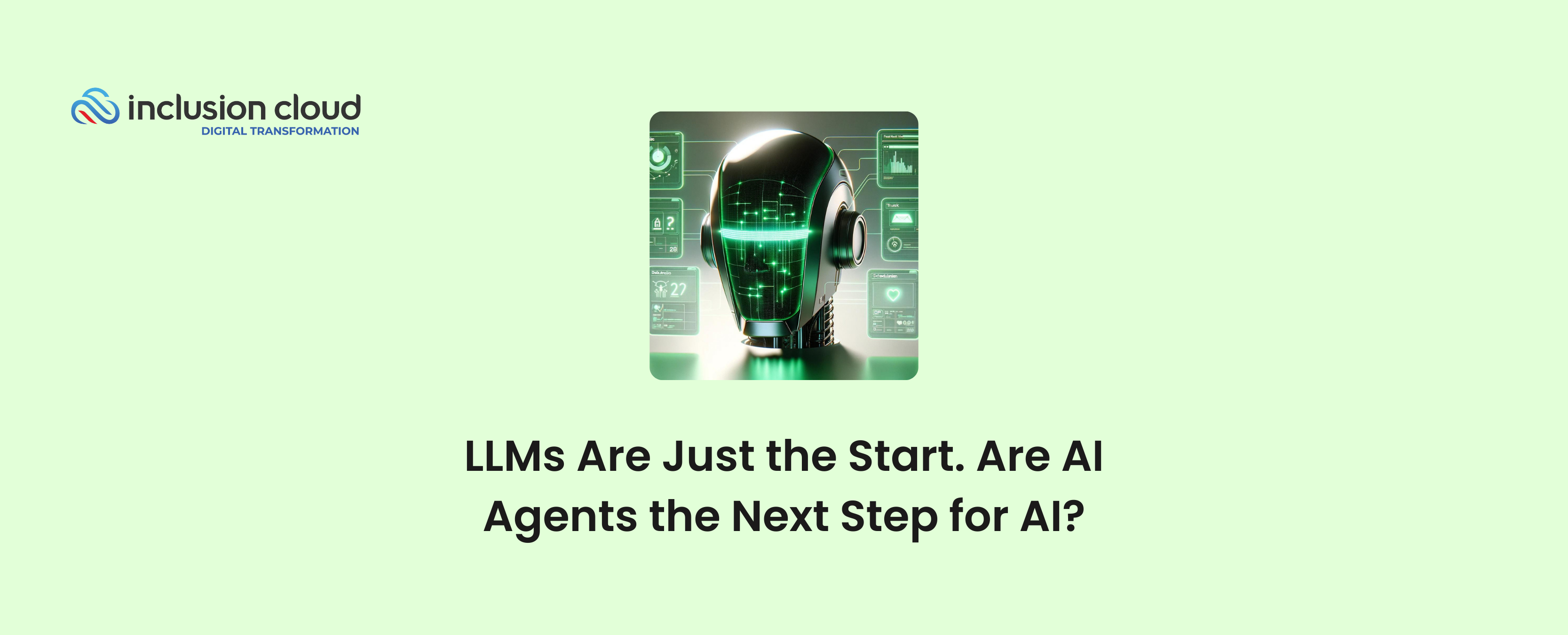For many years, AI agents have been staples in those typical “top tech trends predictions” for the coming year. But it seems that in the last few months, things have accelerated a bit with the recent announcements from big tech companies.
ServiceNow, at Knowledge 24, showcased a demo of their Virtual Assistant in Now Assist that helps with tasks such as completing onboarding for a new employee (it can take the photo ID badge, and provide special details about the trajectory of their new manager) or hiring a new Internet provider while you’re struggling on an especially important call.
Google and OpenAI are in a special battle for AI leadership. While Google was preparing to announce Project Astra, OpenAI took the lead by unveiling GPT-4o a day before Google’s announcement. This model, supported by Microsoft, introduced an assistant with a voice that might sound familiar to Scarlett Johansson’s (Remember Her?) and announced that it would be available for free to all ChatGPT users, launching an advanced and responsive AI chatbot, closer to a multimodal virtual agent that can execute different tasks.
Google then introduced Project Astra in a pre-recorded demo in which their AI assistant proved its capacity to interpret spoken instructions and visually evaluate its surroundings. This agent was capable of engaging in real-time voice conversations with humans, performing tasks from interpreting computer code to locating a lost pair of glasses, all highlighted at the Google I/O conference.
That seems to be the vision of many tech leaders, like Sam Altman, who are focused on designing agents that go beyond virtual interfaces to assist humans with practical tasks in the real world.
In this article, we’re going to discuss the differences between LLMs and AI agents, whether it’s fair to say that these virtual agents are the next step for AI, their potential business applications, the challenges, and what it takes for this technology to become mainstream.
Is It Fair to Say AI Agents Are the Next Step for LLMs?
When we think about the things that an LLM could do, and then compare it with the capabilities of an AI agent, we could say that is the next step in the history of AI.
Large Language Models (LLMs), like GPT-4, are specific types of artificial intelligence that are trained primarily on giant databases of text data from the Internet to generate text that mimics human writing. They excel in tasks like translation, summarization, and answering questions based on patterns learned from data.
At this point, we all somewhat understand what ChatGPT can do for us. So, let’s see what the promise of the AI Agents is.
AI agents, on the other hand, refer to a broader class of AI systems that can interact with their environment in a goal-directed way. These agents may use LLMs as one component of their operation but are not limited to just processing text. They are multimodal and can incorporate other capabilities such as visual recognition, voice interaction, and decision-making to perform a wide range of tasks (later we put on that).
Without a doubt AI Agents are a big leap forward because they represent a broader application of artificial intelligence, where multiple types of AI technology, including LLMs, come together to solve more complex, real-world problems.

We Already Have Automation. What Is the Difference Between AI Agents & RPA Automation
The distinction between AI agents and RPA (Robotic Process Automation) is crucial for organizations to understand, as each technology serves different purposes and offers distinct benefits.
RPA is designed to automate routine, rule-based tasks that are clearly defined and repetitive. This type of automation is incredibly effective for tasks like data entry, processing standardized forms, or managing scheduled reports—areas where you need consistency and speed, but you don’t need complex decision-making.
In contrast, AI agents can analyze data, learn from interactions, and make informed decisions, capabilities far beyond the scope of basic RPA. This makes AI agents ideal for roles involving customer interaction, personal assistant, and scenarios where they must act based on changing information.
Where AI Agents Could Make a Huge Impact?
Last year, researchers from Google and Stanford University conducted a truly insightful experiment, creating a virtual village inhabited by about two dozen ChatGPT-powered characters.
Unlike typical non-player characters (NPCs) in video games, which are programmed with predetermined dialogue sequences and actions, these characters developed their own behaviors based on short biographies provided by the researchers. These biographies included details such as name, age, job, family, interests, and habits. The agents then used a large language model to generate actions consistent with their prescribed biographies, resulting in behavior that was dynamically responsive and believably humanlike. They could perform daily routines, socialize, remember past interactions, and even plan events based on their experiences.
This breakthrough showcases the potential of AI agents to run autonomously in complex environments, heralding new opportunities for their adoption in various business sectors.
According to BCG, there are two principal areas where AI agents could be used:
1. Automating Entire Workflows:
AI agents have the capability to fundamentally change how companies operate by enabling holistic automation across various business functions. These agents can independently execute entire workflows by leveraging LLMs to sense, act, and iterate on tasks. They can dynamically interact with enterprise systems through API calls, receive instructions, and provide results, thereby streamlining operations and significantly reducing labor costs.
This means that in sectors like marketing, for example, an autonomous agent could manage a full campaign from the initial concept to the execution and analysis, continuously learning and adapting its strategies based on what works and what doesn’t.
2. Simulations at Scale:
AI agents also have the potential to revolutionize simulations, offering a more dynamic and cost-effective approach than traditional methods. They can conduct sophisticated, large-scale simulations to test various business strategies or product market fits without human intervention. This capability is particularly useful in academic research and social sciences, where understanding complex social behaviors or market dynamics is crucial.
At Inclusion Cloud, we see other opportunities for those agents to transform the way we work and add value to our business.
I. Personal Assistant & Customer Service
As we saw in the demo at Knowledge 24, ServiceNow demonstrated their virtual assistant integrated into Now Assist, which can proactively detect why an app is crashing. Once the issue is detected, the agent resolves it by updating the software. But it doesn’t stop there; the assistant also identifies apps that are no longer in use but still incur subscription fees, creating unnecessary costs for the company. It then gives users the option to either delete these apps or keep them.
Additionally, if we are experiencing issues with our Internet connection, the AI agent could take the initiative to suggest hiring a new plan with more GBs to solve the problem. It can then call the provider, upgrade the plan, execute the credit card payment (asking for permission from the user, of course), and resolve this issue within seconds.
When it comes to customer service, we have significant opportunities here. Imagine you run a small online store. An AI agent can act like a super-efficient customer service rep. For instance, it could chat with customers in real-time, helping them track their orders or answer questions about products. If a customer is looking at a coffee maker but seems hesitant, the AI could offer them a special discount code or suggest a popular coffee brand available at your store, making the shopping experience personal, engaging, and accessible in everyday language (whether it be via voice, text, or video).
II. HR Onboarding
Think about a new employee starting at your company. Instead of personally walking them through every step, an AI agent could take over, guiding them through paperwork, setting up their email and work tools, and even suggesting which documents to read first. It could assist the new hire in taking a picture and transforming it into an ID badge for building access. Then, it could schedule their first week’s meetings with key team members, provide details about their career trajectory in the company, and remind them about upcoming training sessions, making them feel welcomed and well-informed from day one.
III. Recruiting
AI agents can turn recruiting on its head by doing more than just filtering resumes. They could actively scout for talent, reaching out to potential candidates on social media or professional networks. By analyzing data, they could predict who might be ready for a job change, even before the candidates themselves have thought about it. This proactive approach means you could be the first to snag top talent.
Gaming & Interactive Media
Imagine NPCs in video games and interactive media that are not just scripted characters but truly alive entities within their digital worlds. These AI-powered NPCs could interact with players in dynamic and unpredictable ways, adapting their behaviors based on the player’s actions and decisions. For example, if a player frequently engages in side quests, the NPC might start offering unique missions, tailored advice, or hidden game lore, enhancing the gaming experience.
In an interactive educational platform, these “alive” agents could act as personal tutors, adjusting their teaching methods based on the learner’s progress and interests.
Well, GPT4-o is already helping to teach math:
IV. Translation
Imagine AI agents capable of translating languages in real-time, seamlessly bridging communication gaps in every interaction. These agents could instantly translate spoken and written words across multiple platforms—whether in business meetings, customer support calls, educational content, or social interactions.
For instance, during a multinational video call, an AI agent could provide live subtitles or dubbing, allowing participants to fully engage in their native language.
V. Coding
Coding agents, like the AI software engineer named Devin from Cognition Labs, are now capable of building and deploying entire applications. This marks a significant advancement from early AI agents like AutoGPT, which had limited practical utility.
Devin, for instance, has demonstrated the capability to autonomously handle programming tasks that would typically require a junior developer. This AI agent can not only write code but also debug and optimize it, achieving a success rate of nearly 14 percent in resolving issues on GitHub. While currently it might still require oversight by more experienced developers, the potential for growth and increased autonomy in AI-driven coding is immense.
Why AI Agents Aren’t Everywhere (Yet)
AI agents are set to disrupt our daily lives and work, but why aren’t they everywhere?
The answer rests in a combination of ongoing technological advancements and societal concerns. Take, for example, an AI developed to manage personal finances. It must sync flawlessly with several financial systems, each with its own security procedures, offering huge integration issues that are still being worked out.
Moreover, the complexity of these systems means that an AI agent, like one managing medical records, must not only decode medical jargon but also adapt to varied data entry styles of different doctors— a tall order that often leads to errors.
Also, these systems open doors to sophisticated cyber risks that must be navigated with care. For instance, phishing attacks could trick AI agents into divulging sensitive information, while prompt injections might manipulate agents into executing unintended actions. Data poisoning, where corrupt data is intentionally fed into the system, could skew an AI agent’s algorithms, leading to flawed decisions. That’s no small feat because we’re talking about pouring a significant amount of personal and business data into these systems.
The ethical problems complicate the situation even further. If your AI starts suggesting actions based on private conversations, it’s crossing a line. Where does helpful end and invasive begin? What matters if the agent takes some action that could cause harm?
If There Are More AI Agents, Will This Be the Age of Machine Customers?
If AI agents become ubiquitous, could we witness the dawn of ‘machine customers’? That is a concept that has been around since analysts such as Gartner began to forecast this scenario. And it could be happening in the next few years, if AI agents become more integrated with our lives, making our purchases and assisting us in many of our tasks and duties.
If you’re curious about the topic, you can read our article, “Are Machine Customers Redefining the Future of Commerce?”
Conclusion
“We are in the very early days,” Google CEO Sundar Pichai emphasized in a recent interview, signaling that while the horizon is bright, we’ve got a long way to go.
One of the biggest obstacles is trust. Trust the agents’ functional skills, as well as their ethical governance and data security. Businesses are attracted by the efficiency and opportunities that AI agents offer—imagine AI-powered customer service systems that not only answer to requests but also anticipate demands and address problems proactively. Or HR representatives who not only onboard workers but also support their ongoing professional growth through tailored learning and career planning.
However, along with these benefits come complex challenges.
The multifaceted nature of AI agents brings risks like phishing, prompt injection, and data poisoning, demanding stringent security controls. Ethical issues are also critical since firms must evaluate the privacy consequences of deploying autonomous agents that handle a lot of personal and sensitive data.
Looking forward, the potential of AI agents extends beyond game-changing business applications to broader societal impacts. Could the proliferation of AI agents herald an era of ‘machine customers,’ where AI systems not only execute tasks but also make autonomous purchasing decisions? This scenario could redefine market dynamics and consumer behaviors.
Did you enjoy the reading? Follow us on LinkedIn and subscribe to our bi-weekly newsletter for more insights like this.





